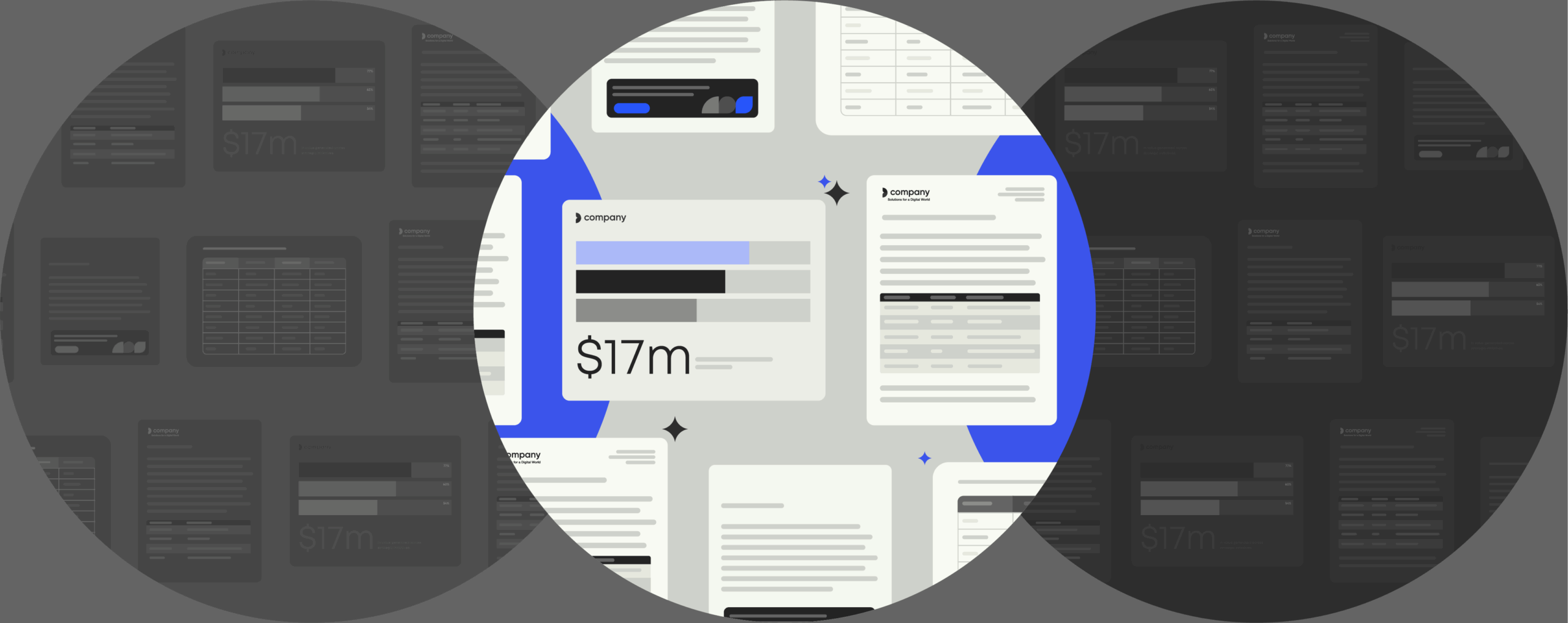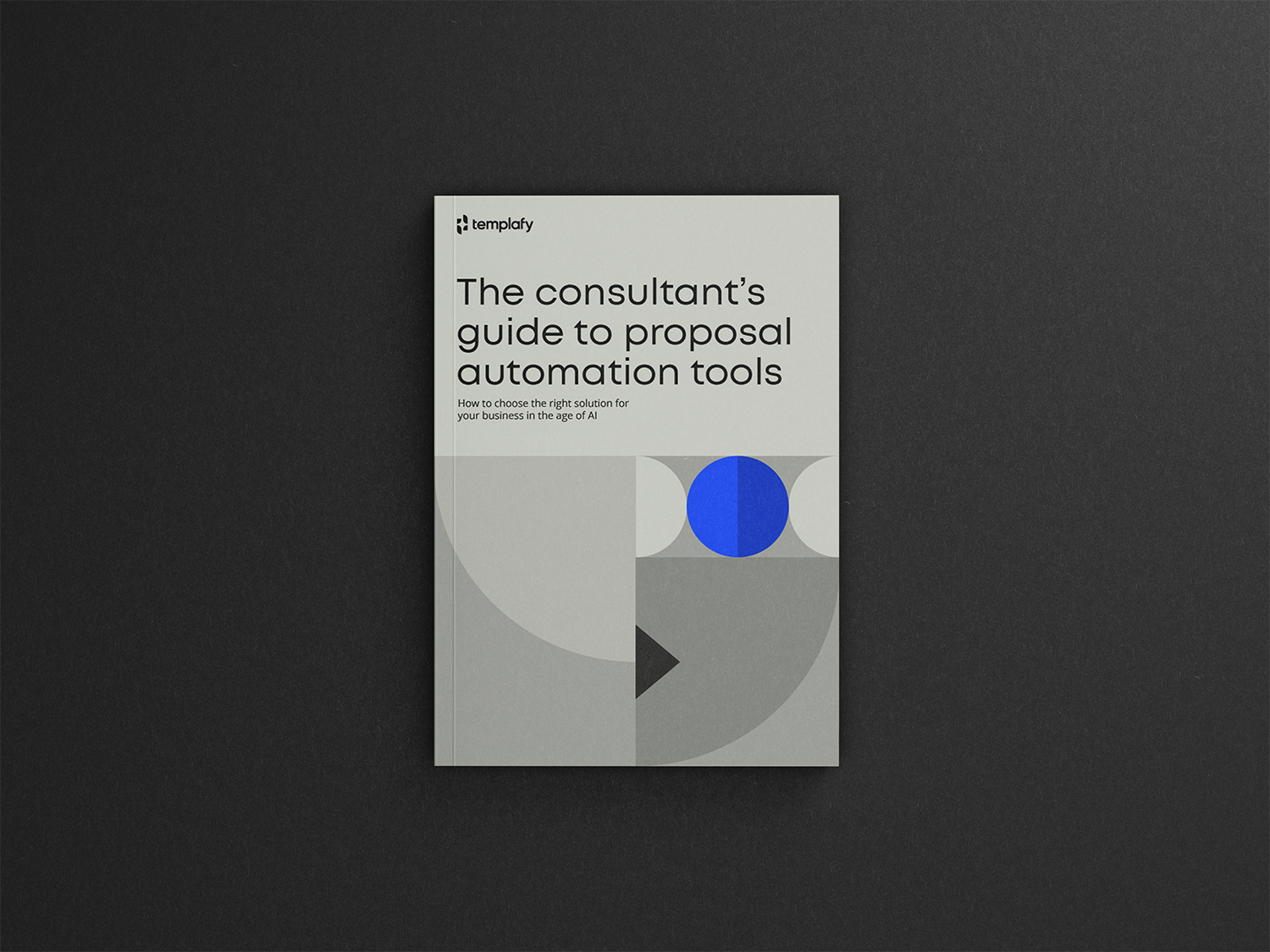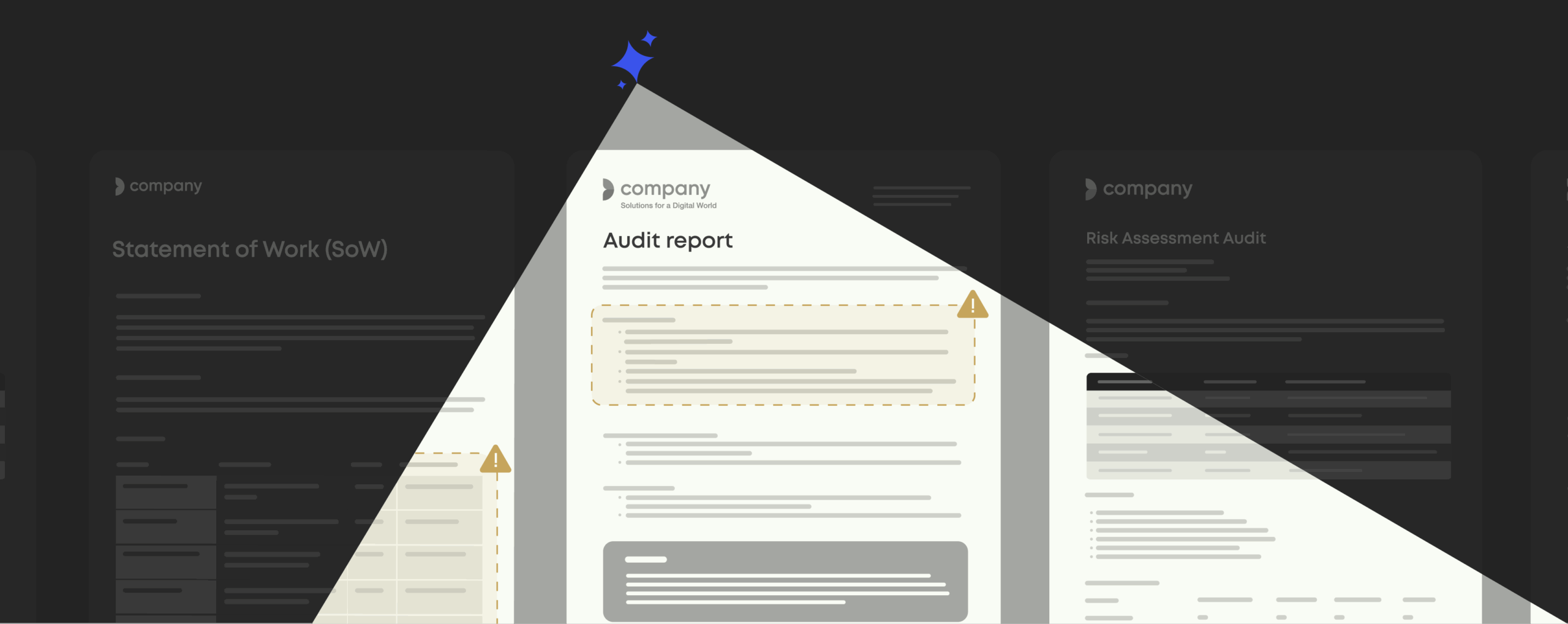The impact of AI on document management systems

Al is changing how organizations handle every document.
For years, document management has focused on storage and delivery. Files went in, files came out, and teams spent hours tagging, sorting, and searching just to stay organized. That era is over.
AI-powered document management systems are reshaping how organizations create, manage, and protect content. They can identify document types, tag and update files automatically, enforce compliance rules in real time, and surface the exact content employees need without manual effort.
With platforms like Templafy, document management is becoming an intelligent ecosystem filled with smart features to help teams create better documents.
What is an AI-powered document management system?
A document management system (DMS) helps organizations store, organize, and track files digitally. An AI document management system goes further. It uses artificial intelligence to classify documents automatically, extract key data, detect duplicates, and ensure compliance without manual input. Instead of simply holding information, it learns how teams work, improving accuracy and efficiency over time.
The evolution of document management
Document management started as a way to store digitized versions of paper documents, focusing on organization and access control. Early systems solved the storage problem, but users still had to name files carefully, tag them manually, and hunt through folders to find the right version.
AI changes that. A contract uploaded to an AI-powered system, for example, can be instantly classified as “vendor agreement,” tagged with renewal dates, and checked for missing clauses. In healthcare, AI can flag outdated patient consent forms before they cause compliance issues. In finance, it can verify that only the latest regulatory templates are in circulation.
These intelligent loops—automating tagging, ensuring compliance, and surfacing information when needed—free people from repetitive tasks and reduce risk. In fields such as finance, legal, and healthcare, where accuracy and traceability are essential, AI shifts document management from simple storage to a reliable layer of protection for the business.
Read more: How to build an enterprise AI strategy that scales, sticks, and delivers ROI
document management
4 ways AI is powering modern document management
- Smart classification and tagging
- Natural language search
- AI-driven compliance and governance
- Predictive insights
Work smarter with automation
Discover new ways to save time and reduce errors with document automation. See how teams use smart tools to work faster.
1. Smart classification and tagging
AI can instantly recognize what type of document it’s handling and assign accurate metadata. A financial services team, for instance, can upload thousands of reports, and the system will automatically classify them as invoices, contracts, or statements while tagging each with relevant dates, clients, and regions.
2. Natural language search
Traditional search depends on exact keywords. AI changes that by understanding meaning and context. Instead of searching for “Q3 report 2024,” a user can simply type “last quarter’s revenue breakdown” and get precise results, even if the file names or formats vary. In a legal firm, this allows teams to surface relevant case files or clauses, reducing research time.
3. AI-driven compliance and governance
AI can help detect documents that are out of date or non-compliant with company or industry regulations. The system can flag outdated templates, detect missing disclaimers, or identify documents shared outside approved channels. In financial documents, for example, it can spot reports that use old regulatory wording and alert teams before those documents reach clients or auditors.
4. Predictive insights
Beyond managing content, AI can analyze how documents are used. It can identify which templates are outdated, which teams struggle with version control, or which content is not being used anymore. A legal department might receive insights showing that certain contracts are repeatedly redlined for the same clause, suggesting an area for improvement.
AI document management vs. manual workflows
| Traditional DMS | AI-Powered DMS |
|---|---|
| Manual tagging, filing, and versioning | Automated classification and version control that improves over time |
| Static repositories that require user input | Living systems that learn from usage patterns and update automatically |
| Users search for content manually | The right content surfaces proactively based on context and user needs |
| Compliance checks handled after the fact | Real-time compliance monitoring and automatic policy enforcement |
| Limited visibility into document usage | Predictive analytics reveal trends, risks, and process gaps |
5 ways Templafy uses AI to improve document workflows
Templafy’s platform brings the intelligence of AI directly into every stage of document creation and management. And rather than adding another tool to your tech stack, it builds it into the apps your teams already use, like Microsoft 365 or Google Workspace.
- AI document agents
Templafy’s document agents automate repetitive work by generating, updating, and validating business documents in real time. They can pull approved data, formats, and language directly from your company’s connected systems.
- Smart search and retrieval
Templafy understands natural language queries and retrieves contextually relevant content, surfacing the needed documents or templates without requiring exact matches in keywords. - Built-in document governance
Every document in Templafy is automatically checked against brand, legal, and compliance rules with customizable settings for version control, metadata management, and content validation. - Connect every platform across the enterprise
Templafy integrates seamlessly with tools like Microsoft 365, Google Workspace, and leading CRM systems. These connections make it easy to automate document workflows across departments without changing existing processes. - Protections for regulated industries
For financial and legal teams, Templafy ensures every contract or report follows the latest compliance standards automatically. In accounting, AI tools for document accuracy detect errors before documents are shared.
Additional content
Moving from manual to automated document creation
What to consider when upgrading to an automated document management system.


What to look for in an AI Document Management System
Not all AI document management systems are created equal. The right platform should fit seamlessly into your existing workflows, scale with your business, and deliver measurable value. Before investing, it’s worth asking a few key questions to separate useful solutions from marketing hype.
Is the system built to understand your business context?
Ask vendors how well their systems understand your business context. Can the AI recognize your document types, apply the right templates, and enforce company-specific rules automatically? Look for tools that combine intelligent document creation, search, and compliance.
Can the system scale and integrate with your existing tools?
Successful tech depends on usability—and that starts with integration and onboarding. Choose a solution that integrates with core enterprise tools like Microsoft 365, Google Workspace, and your CRM. Just as important is data protection. Ensure the platform uses secure, compliant cloud architecture with detailed access controls, encryption, and audit trails to safeguard sensitive information.
Why choose Templafy for enterprise document management?
Templafy combines the intelligence of AI with the reliability of enterprise-grade governance. Unlike stand-alone systems, Templafy embeds directly into your existing environment, making it easy for people to start using it without extensive training.
The future of document automation
The next generation of document management will think, anticipate, and act independently. Generative AI is already moving beyond document management into document creation, producing first drafts, filling in missing data, and updating content automatically based on company-approved sources.
At the same time, proactive compliance systems are emerging to spot risks before they become problems. Instead of catching outdated templates or missing clauses after documents are shared, AI will alert teams in real time, helping organizations stay compliant without constant manual review.
This evolution is building what many enterprises are already calling knowledge ecosystems: connected networks of content, context, and control. Documents are no longer isolated files but living assets that learn from how people use them.
Tools like Templafy show how this evolution is already underway, bringing intelligence to the everyday flow of enterprise content.
Ready to see intelligent document management in action?
Discover how Templafy’s AI-powered platform automates creation, ensures compliance, and connects your entire content ecosystem. Book a demo with our experts today to learn more.
FAQs
What is an AI document management system?
An AI document management system uses artificial intelligence to organize, analyze, and control documents automatically. Instead of relying on manual tagging or filing, it understands content, applies metadata, and ensures every file is stored and used correctly across the organization.
How does AI improve document management?
AI improves document management by automating repetitive tasks like classification, search, and version control. It can identify compliance issues, retrieve the right content instantly, and even predict when documents need to be updated.
What are the benefits of an AI-based DMS?
An AI-based DMS increases efficiency, accuracy, and security. It helps teams find information faster, ensures brand and legal compliance, and reduces the cost of managing large volumes of content. Over time, it also learns from user behavior, continuously improving performance.
How is Templafy different from other AI document management systems?
Templafy goes beyond storage to deliver full document lifecycle automation. Its AI-powered tools connect directly with Microsoft 365, Google Workspace, and CRM systems to generate, govern, and distribute content automatically. Unlike standalone tools, Templafy builds compliance and brand control into every workflow, keeping documents accurate, secure, and on-brand at scale.
Is AI document management secure?
Yes. Enterprise-grade AI document management systems like Templafy use strict security protocols, including encryption, access controls, and detailed audit trails. They’re designed to meet global data protection standards while giving organizations full visibility into who accesses, edits, and shares content.



